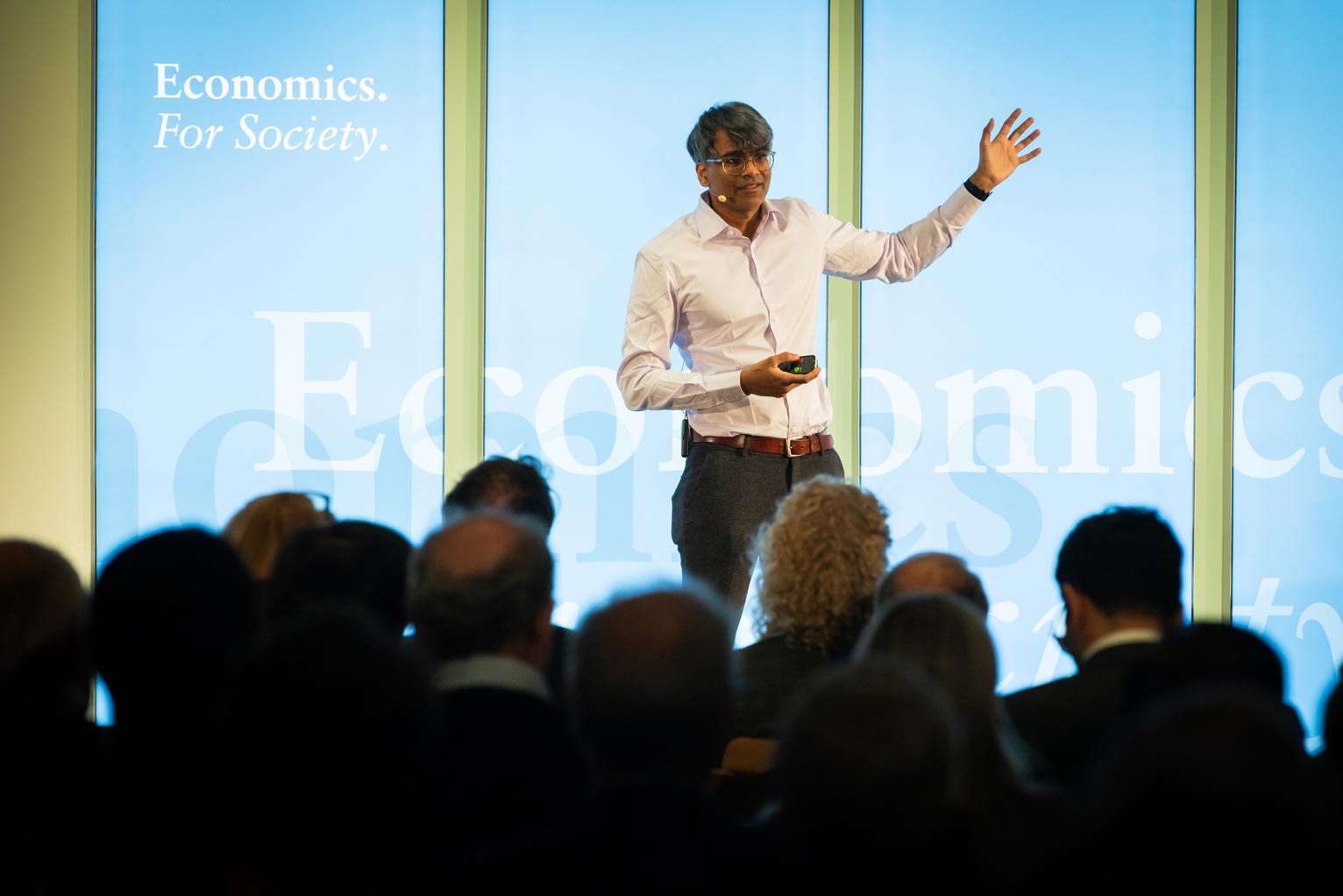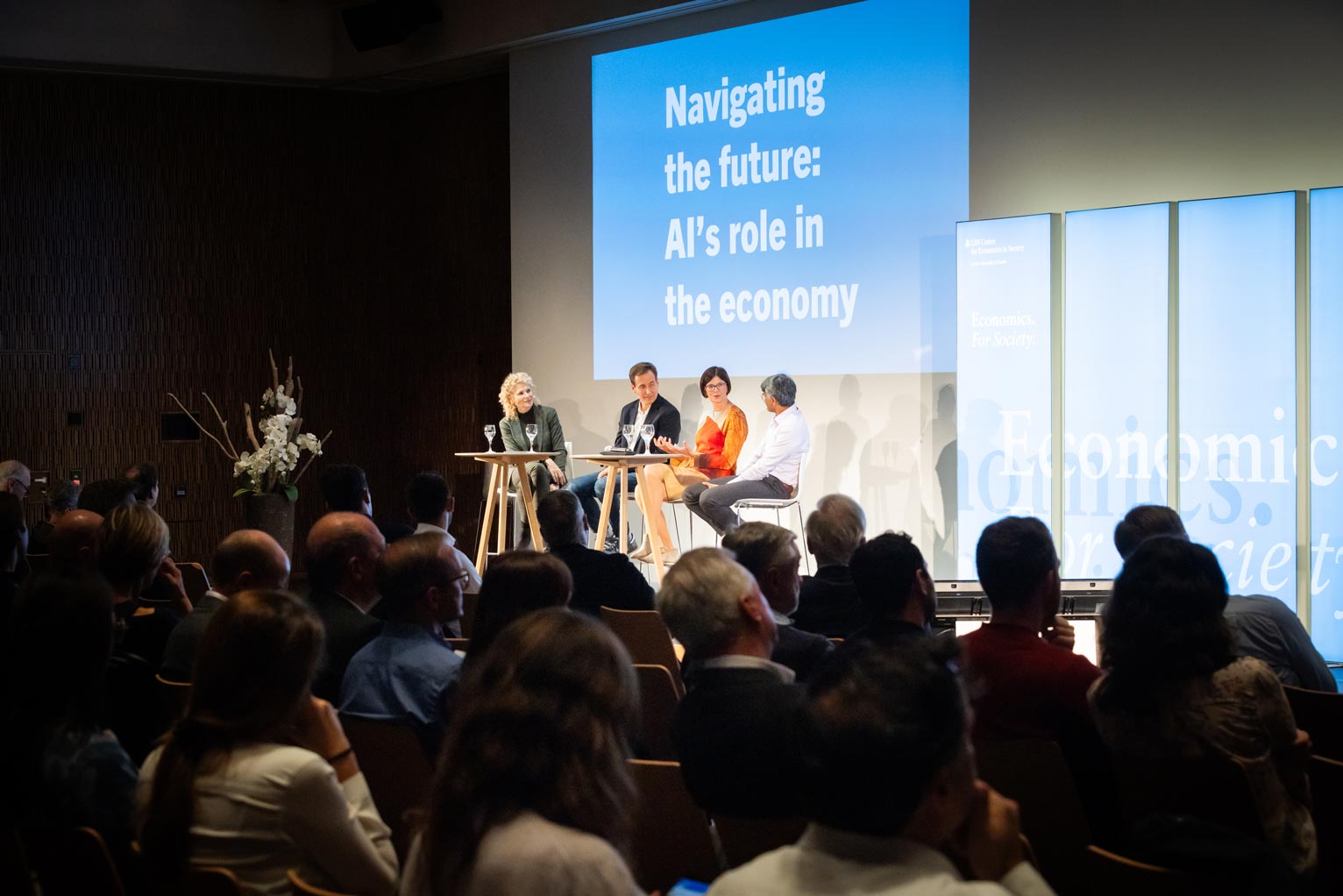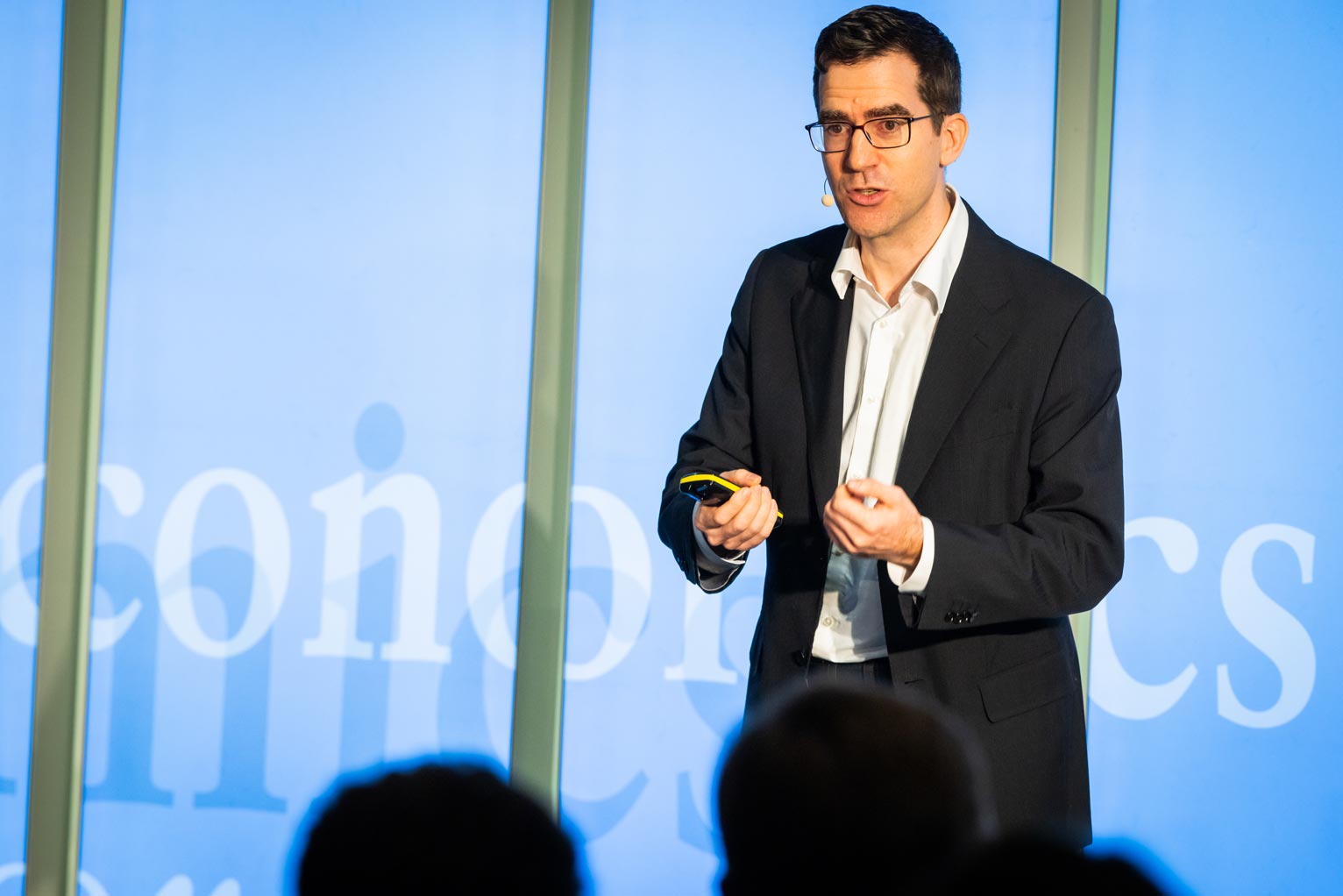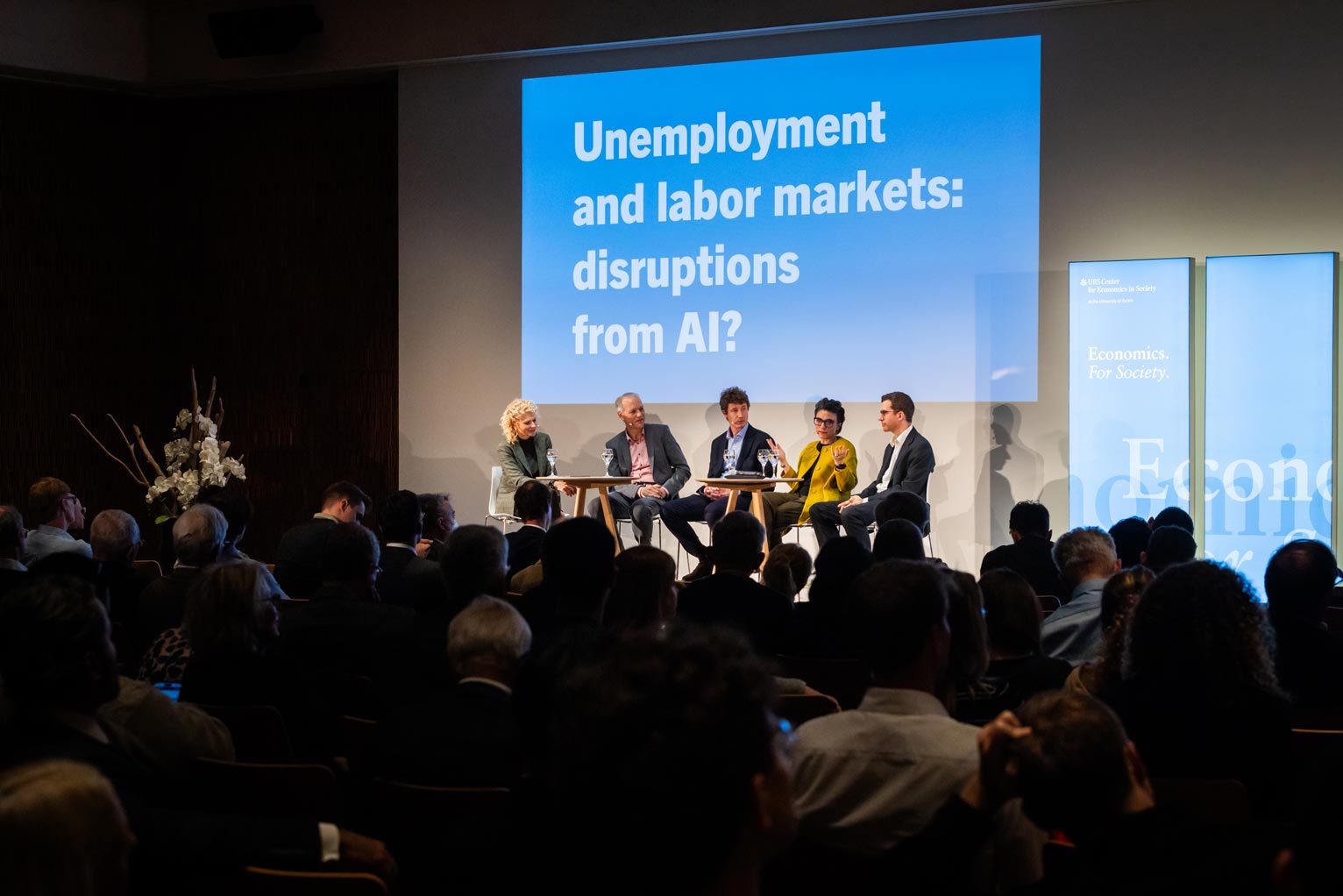Jump directly to
Economic realities beyond the hype
On October 31, 2024, the UBS Center Forum for Economic Dialogue gathered a significant audience to hear insights from leading experts on the role of AI in our society. Despite intense discussions about the risks and misuse of AI, the overall assessment of the new technology was positive. With the right foundations in place, AI holds immense potential to drive innovation, increase prosperity, and reduce inequality.
Maura Wyler (Text) & Ueli Christoffel (Images)
Lecture by Sendhil Mullainathan (MIT)
Sendhil Mullainathan, a renowned thought leader in behavioral economics and AI, challenged the audience to rethink their assumptions about artificial intelligence. He remarked, “AI is not just a tool for automation but a bicycle for the mind that augments human capabilities.” His lecture highlighted the transformative potential of AI, urging participants to “look beyond the hype and focus on practical applications that could foster innovation and growth.” Mullainathan’s insights encouraged deep reflections on the ethical implications of AI, emphasizing the importance of ensuring that technological advancements promote social justice and equality of opportunity. He posed critical questions about the future, challenging participants to consider how society can harness AI to drive innovation while addressing its societal impacts. Underscoring that AI’s role goes beyond automation, he illustrated its ability to enhance decision-making processes across diverse sectors. Rather than focusing solely on defensive measures, Mullainathan called for proactive efforts, stressing the importance of using the current window of opportunity to build a desirable future. He concluded, “We need ambitious builds for meaningful problems and not just safety of whatever is being built right now.”
Panel discussion “Navigating the future: AI’s role in the economy”
On the first panel, Sendhil Mullainathan was joined by Gregory Crawford (Zalando and University of Zurich) and Catrin Hinkel (Microsoft Switzerland) who engaged in a critical discussion about AI’s capacity to drive economic growth and address inequalities. Prof. Crawford noted that “AI can enhance decision-making processes within companies,” while Hinkel emphasized the need for accountability in AI implementation. Mullainathan reinforced the importance of focusing on practical applications to maximize AI’s societal benefits. The discussion underscored the urgency of establishing regulatory frameworks that ensure responsible AI usage, fostering active engagement from participants who raised concerns about the future of AI across various sectors.
Keynote by David Dorn (University of Zurich)
In his keynote, David Dorn, UBS Foundation Professor of Globalization and Labor Markets, examined the economic ramifications of AI-driven automation. In Dorn’s view, AI has the potential to reshape the labor market, addressing inequalities caused by past digitalization trends. While previous waves of computerization displaced many mid-level routine jobs and led to market polarization, AI could reverse this trend by enhancing the competencies of less-qualified workers, enabling them to perform higher-level tasks. Dorn envisions AI empowering roles in healthcare, education, and law, allowing workers with basic training to take on duties traditionally reserved for specialists. For instance, AI might assist nurses in interpreting X-rays or help paralegals perform tasks currently handled by attorneys. Also, AI could not only boost productivity but also create new job opportunities, offering hope for a more equitable labor market in the future. However, Dorn remains cautious, emphasizing the need for careful, collaborative integration of AI into the workplace to balance opportunities and challenges.
Panel discussion “Unemployment and labor markets: disruptions from AI?”
The second panel, including Prof. Dorn, Christine Antlanger-Winter (Google Switzerland), Valerio Capraro (University of Milano-Bicocca), and Jan-Egbert Sturm (ETH Zurich), tackled the complexities of AI’s impact on the labor market. Christine Antlanger-Winter highlighted a study by Google projecting that generative AI could boost Switzerland’s GDP by CHF 80–85 billion annually, enhancing productivity in 66% of jobs, particularly in healthcare and finance, but warned that delayed adoption could reduce this potential to just 3%. Prof. David Dorn reiterated that AI is unlikely to cause mass unemployment, as past technological advancements have consistently created new jobs and upskilled workers, though addressing biases in AI systems is essential to prevent reinforcing societal inequities, especially in hiring and decision-making. Prof. Valerio Capraro affirmed Dorn’s statement, stating that AI often inherits and amplifies biases from training data, making it difficult to address them without creating new ones. Prof. Jan-Egbert Sturm offered a cautious perspective, noting that while AI could help address demographic challenges and drive sectoral shifts, its overall economic impact may be modest, with productivity gains potentially offset by increased administrative demands.
On October 31, 2024, the UBS Center Forum for Economic Dialogue gathered a significant audience to hear insights from leading experts on the role of AI in our society. Despite intense discussions about the risks and misuse of AI, the overall assessment of the new technology was positive. With the right foundations in place, AI holds immense potential to drive innovation, increase prosperity, and reduce inequality.
Maura Wyler (Text) & Ueli Christoffel (Images)
Lecture by Sendhil Mullainathan (MIT)
Sendhil Mullainathan, a renowned thought leader in behavioral economics and AI, challenged the audience to rethink their assumptions about artificial intelligence. He remarked, “AI is not just a tool for automation but a bicycle for the mind that augments human capabilities.” His lecture highlighted the transformative potential of AI, urging participants to “look beyond the hype and focus on practical applications that could foster innovation and growth.” Mullainathan’s insights encouraged deep reflections on the ethical implications of AI, emphasizing the importance of ensuring that technological advancements promote social justice and equality of opportunity. He posed critical questions about the future, challenging participants to consider how society can harness AI to drive innovation while addressing its societal impacts. Underscoring that AI’s role goes beyond automation, he illustrated its ability to enhance decision-making processes across diverse sectors. Rather than focusing solely on defensive measures, Mullainathan called for proactive efforts, stressing the importance of using the current window of opportunity to build a desirable future. He concluded, “We need ambitious builds for meaningful problems and not just safety of whatever is being built right now.”



